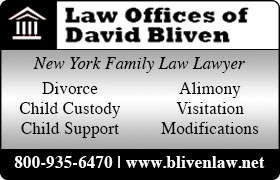Dobbs Ferry Child Support Lawyer, New York, page 3
Sponsored Law Firm
-
 x
x

Click For More Info:
-
The Law Offices of David Bliven
445 Hamilton Avenue, Suite 607, White Plains NY, 10601 » view mapFamily Law, Divorce, Child Support, Custody Representing All of Your Family Law Needs
With over 17 years of experience helping people through difficult family law issues, we have the knowledge and skill needed to ensure you and your children are protected.
914-861-4805  David Bliven White Plains, NY
David Bliven White Plains, NYAttorney At Law - New York, 1998
New York Law School, J.D. - 1997
 About Us
About Us16 years of experience helping people of Greater White Plains and the Bronx, New York with Family Law issues.
 Our ServicesAll Family Law
Our ServicesAll Family LawCivil unions, marriages, divorces, adoption, prenuptial agreements, child custody, and property settlements.
Julia Louise Masch
Litigation, Child Support, Custody & Visitation, Divorce & Family Law
Status: In Good Standing Licensed: 33 Years


 David Bliven White Plains, NY
David Bliven White Plains, NY About Us
About Us Our ServicesAll Family Law
Our ServicesAll Family Law
